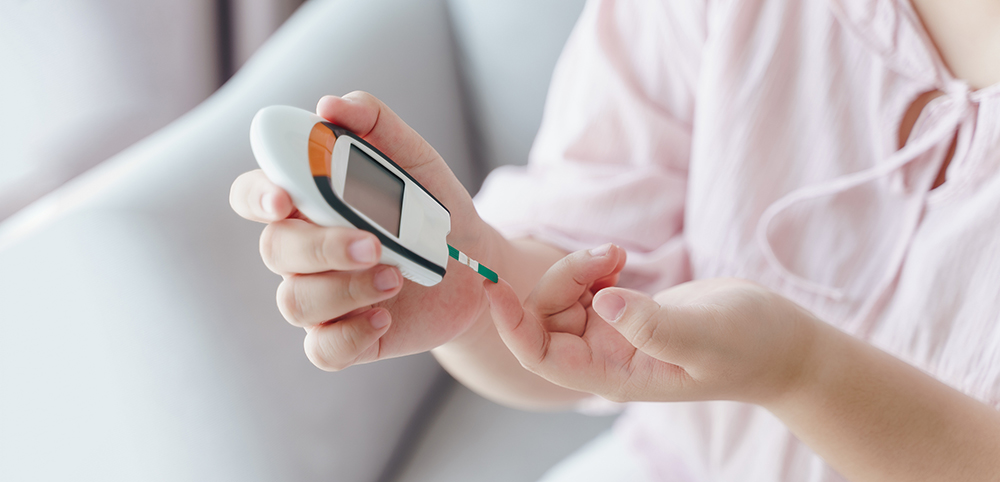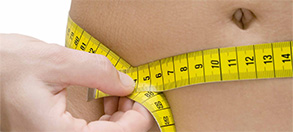What is Prediabetes?
Prediabetes is a health condition that precedes type 2 diabetes. With prediabetes the blood sugar levels are higher than normal, but not yet high enough to be considered type 2 diabetes. Prediabetes increases the risk of developing type 2 diabetes, heart disease, and stroke. According to the CDC, 1 in 3 Americans have prediabetes and 80% of those do not even know they have it.1
Symptoms of Prediabetes
Unfortunately, prediabetes symptoms usually don’t present until it’s too late, so it often goes undetected. There are some possible signs that may appear such as darkened skin on the neck, armpits, or groin. If you notice these signs or have any of the following risk factors for prediabetes you should speak with your doctor about testing for prediabetes. 1,2
Prediabetes Risk Factors:
- Being overweight
- Poor Diet
- Being 45 years or older
- Having family history of type 2 diabetes
- Sedentary lifestyle (little to no exercise)
- Having gestational diabetes
- Having Polycystic ovary syndrome
- Black, Hispanic, American Indian, and Asian American people have an increased risk
- Tobacco smoke
- Sleep Apnea
If you have any of the risk factors mentioned above and experience any of the following symptoms, you may have type 2 diabetes and should talk with your doctor immediately.
Symptoms of Type 2 Diabetes:
- Increased thirst
- Frequent urination
- Increased hunger
- Fatigue
- Blurred vision
- Numbness/tingling in feet or hands
- Frequent infections
- Slow-healing sores
- Unintended weight loss
What Causes Prediabetes?
Prediabetes is caused by your body’s inability to process sugar (glucose) properly.
Normally, when you eat food sugar enters the bloodstream, the pancreas produces insulin that allows the sugar to enter your cells, and therefore, lower the amount of sugar in the blood. As your blood sugar level drops during this process, the pancreas should slow down the secretion of insulin. When you have prediabetes, this process may not function properly, and sugar can build up in the bloodstream.
The exact root cause of prediabetes is unknown, but family history and genetics do a play a role. 2
Prediabetes Diagnosis
There are a few ways to test for prediabetes.
The glycated hemoglobin (A1C) test indicates your average blood sugar level for the past 2-3 months. Prediabetes levels will be between 5.7% and 6.4%.
The fasting blood sugar test involves taking a blood sample after you’ve fasted for at least eight hours (or overnight). A blood sugar value (measured in milligrams of sugar per deciliter) that is between 100 to 125 mg/dL is considered prediabetic.
The oral glucose tolerance test is typically used for testing gestational diabetes. It involves fasting overnight and then drinking a sugary liquid at a healthcare provider’s office where they will test blood sugar levels periodically over the course of two hours. If the blood sugar levels are between 140 to 199 mg/dL that indicates prediabetes.3
Is Prediabetes Reversible?
Yes. With lifestyle changes you can prevent or delay prediabetes from becoming type 2 diabetes. 4
Diet – A reduced calorie, low fat, and/or low carb diet may help to prevent or delay type 2 diabetes as well as consistently choosing foods that are low in added sugars, saturated fat, and trans-fat. 4
Sleep – Some studies indicate a link between sleep apnea and prediabetes, so treating sleep apnea and getting adequate hours of sleep each night may help to reverse prediabetes. 4
Exercising – Regular exercise will also help prevent and reverse prediabetes. It can be as simple as taking a walk 4-5 days of the week. 4
Losing weight – Losing about 5-7% of your bodyweight will help to lower your risk for developing type 2 diabetes. The National Diabetes Prevention Program is a great resource for those looking to reverse prediabetes, along with our weight loss programs. 5
Weight Loss Programs
Houston Weight Loss Center offers safe and effective rapid weight loss programs that come with step-by-step guides on implementing the above mentioned lifestyle changes (and more) and may also include prescription medications for qualifying patients that can help you reach your health and weight loss goals faster.
At your first appointment we will do a body composition analysis, lab work which includes the A1C test among several other health screenings, as well as a one-on-one discussion and consultation with a nurse practitioner.
If you’re concerned about your health and are ready to get started on your weight loss journey schedule your first appointment today.
References
- Center for Disease Control Staff. 2022. “Prediabetes” U.S. Department of Health and Human Services: https://www.cdc.gov/diabetes/basics/prediabetes.html
- Mayo Clinc Staff. 2022. “Diseases and Conditions: Prediabetes Symptoms and Causes” Mayo Foundation for Medical Education and Research (MFMER): https://www.mayoclinic.org/diseases-conditions/prediabetes/symptoms-causes/syc-20355278
- Mayo Clinc Staff. 2022. “Diseases and Conditions: Prediabetes Diagnosis and Treatment” Mayo Foundation for Medical Education and Research (MFMER): https://www.mayoclinic.org/diseases-conditions/prediabetes/diagnosis-treatment/drc-20355284
- Goodman, Elaine. Griffith, Michelle MD (Medical Review). April 27, 2021. “Naturally Reversing Prediabetes: What to Know” Medical News Today: https://www.medicalnewstoday.com/articles/how-to-reverse-prediabetes-naturally#potential-methods
- Center for Disease Control Staff. August 27, 2021. “National Diabetes Prevention Program” Centers for Disease Control and Prevention: https://www.cdc.gov/diabetes/prevention/index.html



